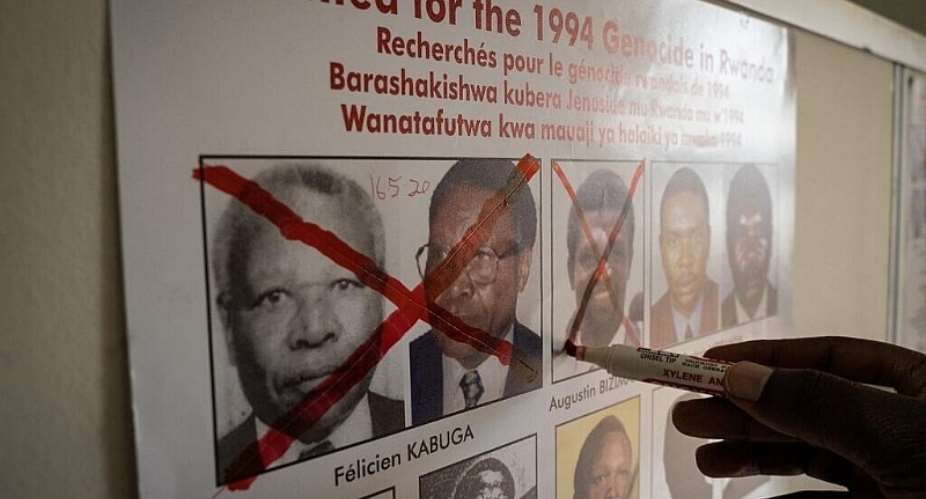Fulgence Kayishema, who is accused of participating in the killing of some 2,000 Tutsi refugees during the 1994 Rwandan genocide, has been arrested in South Africa. He is one of four remaining fugitives sought by the United Nations tribunal for war crimes committed in Rwanda.
A former police inspector in Rwanda, Kayishema is alleged to have participated in the planning and execution of the massacre of over 2,000 Tutsi men, women and children who had taken refuge in a church in April 1994.
He has been on the run since July 2001 and was arrested Wednesday afternoon in Paarl, South Africa, in an investigation carried out with the cooperation of South African authorities.
"Fulgence Kayishema was a fugitive for more than 20 years. His arrest ensures that he will finally face justice for his alleged crimes," Serge Brammertz, the prosecutor for the International Residual Mechanism for Criminal Tribunals (MICT), said in a statement released Thursday.
War crimes
More than 2,000 people died when Nyange Catholic Church in Kivumu, in western Rwanda, was set alight and then bulldozed as they sheltered inside.
Parish priest Athanase Seromba and businessman Gaspard Kanyarukiga have already been convicted for ordering the massacre.
Kayishema was indicted in 2001 by the UN's International Criminal Tribunal for Rwanda, which charged him with genocide, complicity in and conspiracy to commit genocide, and crimes against humanity for murders and other crimes.
“Kayishema directly participated in the planning and execution of this massacre, including by procuring and distributing petrol to burn down the church with the refugees inside,” the MICT said, adding that he and others used a bulldozer to collapse the church, “burying and killing the refugees inside”.
Afterwards, the prosecutor's office said, “Kayishema and others then supervised the transfer of corpses from the church grounds into mass graves over the next approximately two days”.
Worldwide investigation
During the genocide, around 800,000 Rwandans, most of them ethnic Tutsis, died over 100 days at the hands of Hutu extremists.
Brammertz said the investigation that led to Kayishema's arrest spanned multiple countries in Africa and beyond.
The Rwanda tribunal finished trying cases in 2008, after which the MICT was established, taking over the work in 2015.
The tribunal referred Kayishema's case to Rwanda in 2007, after the country had abolished the death penalty, in a bid to encourage countries to hand over genocide suspects.
- Why Macron stopped short of apologising to Rwanda for the 1994 genocide
- France to erect Paris memorial to Rwanda genocide victims
Kayishema was one of only four fugitives still wanted by the MICT.
Three others remain at large: Charles Sikubwabo, Charles Ryandikayo and Aloys Ndimbati.
Top fugitive and alleged genocide financier Felicien Kabuga, who was arrested near Paris in 2020, went on trial at the MICT's Hague tribunal in September 2022.
(with newswires)





 Election 2024: Mahama will destroy my legacy if he wins, so, go out, register an...
Election 2024: Mahama will destroy my legacy if he wins, so, go out, register an...
 UE/R: Your 2-year 'bitterness' towards our members 'shameful' - Three teacher un...
UE/R: Your 2-year 'bitterness' towards our members 'shameful' - Three teacher un...
 'I'm not running for office for power; I just want to solve Ghana’s problems' — ...
'I'm not running for office for power; I just want to solve Ghana’s problems' — ...
 Limited voter registration exercise delays in Tema due to technical problems
Limited voter registration exercise delays in Tema due to technical problems
 Biometric Verification machines fail to function in Kadjebi
Biometric Verification machines fail to function in Kadjebi
 Voter Registration: Technical hitches impede exercise at La Dade Kotopon
Voter Registration: Technical hitches impede exercise at La Dade Kotopon
 Technical issues delay voter registration exercise in Takoradi
Technical issues delay voter registration exercise in Takoradi
 Limited voter registration exercise delays at Keta
Limited voter registration exercise delays at Keta
 V/R: Limited voter registration exercise delays in Hohoe
V/R: Limited voter registration exercise delays in Hohoe
 EC limited voter registration exercise faces massive challenges
EC limited voter registration exercise faces massive challenges
